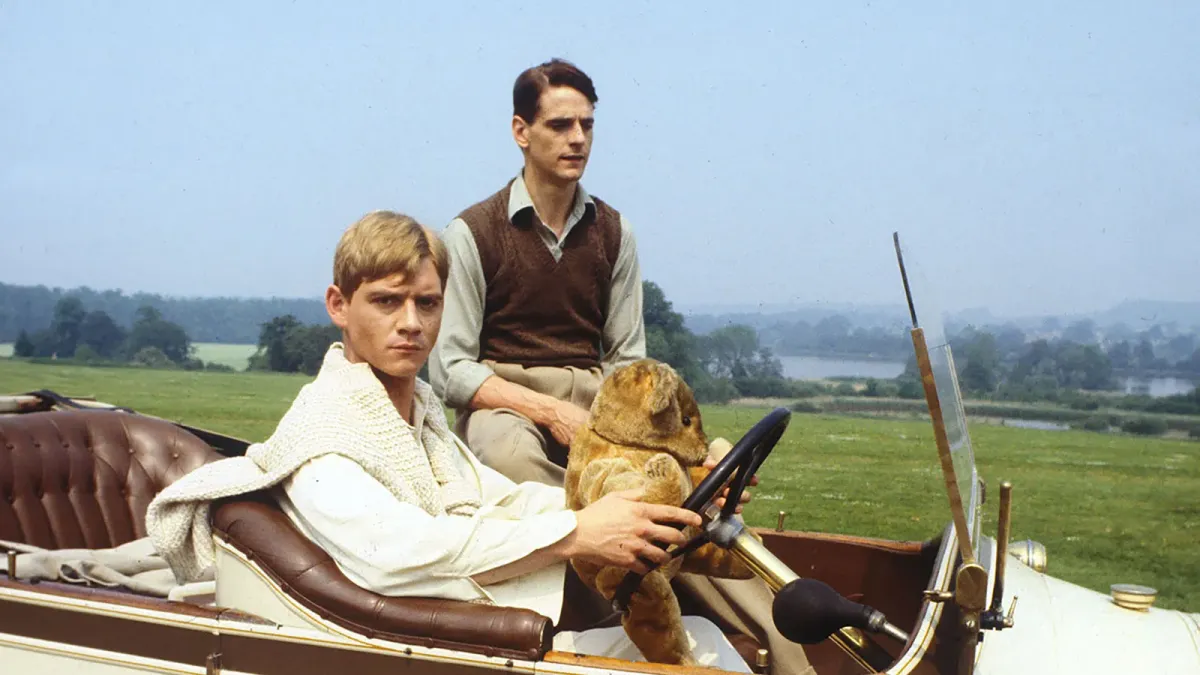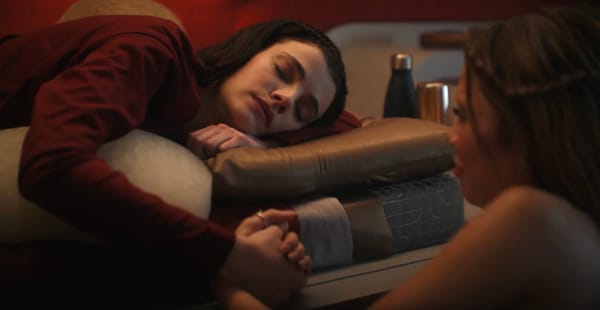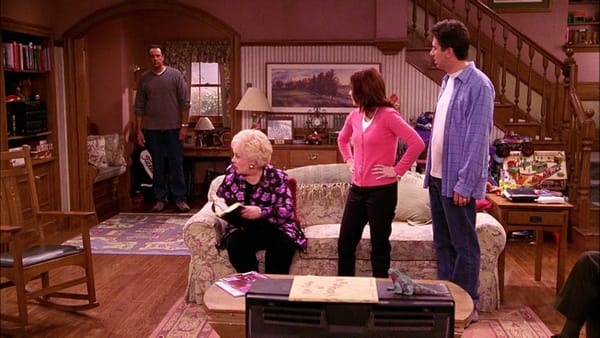LGBTQ+ people are not going back
This post is (somehow) about Evelyn Waugh's Brideshead Revisited.

This post is part of a planned action, headed up by Julia Serano. To read other pieces by queer people who are smarter and better writers than me, go to the master post right here.
Of late, I have been reading Evelyn Waugh's wondrous masterpiece Brideshead Revisited, which I have mostly known as a touchstone for a lot of my favorite novelists. (Lev Grossman always said it was a big influence on The Magicians series, which felt very strange to me until I started reading it.) I knew it had a reputation for being exceptionally queer-coded without being capital-Q Queer. And I knew Waugh was always, like, [adjusts tie] "Actually, it's about how being Catholic is cool and rad," which I guess would mean he would host a leftist podcast that gradually trended toward the reactionary right if he were alive today.
In actually reading the novel, I've been struck by how not-actually-coded the queerness is. One character, Anthony Blake, is directly described as a gay man, and while he never settles down with a long-term partner, this is not treated as a sadness as it would be in other books. Waugh seems to think that being Anthony Blake would kinda rock. As an early overt example of the "catty gay" type, he gets many of the book's best lines, and he's also the only person who can truly see the trap that the British ruling classes have set up for themselves. As the book is, broadly speaking, about the collapse of an aristocratic family between the World Wars, as observed by a young man of lower station who gets drawn into their orbit, I think we're supposed to view Anthony as the one person who can see through the facade of wealth to deeper, harder truths. Then he'll say something very funny.
Anthony's overt queerness, however, stands in marked contrast to the element that is most often cited by those who talk about the book's queerness: Namely, this is a book about two men in love that never once says it's a book about two men in love. Charles (our narrator) first falls in with the Flytes of Brideshead because he becomes fast friends with younger son Sebastian. The first of the novel's three parts is spent almost entirely on Charles and Sebastian's "friendship," which seems to consist of them spending all of their time together, in an intimacy that has the distinct tenor of a love affair. Later, Charles falls for Sebastian's sister, Julia, in part because she looks a lot like her brother. Whomst amongst! Then, when Charles and Sebastian fallout, it's treated with all the emotional devastation of a breakup.
To be clear, Brideshead is never directly condemnatory of queerness in the way it is adultery. (And gosh is it condemnatory of adultery.) Anthony gets to be a fun and memorable character, and if Charles and Sebastian's relationship turned romantic or sexual, the book doesn't hold that idea in obvious contempt. Though Waugh is a fundamentally conservative writer – in the sense of wanting to preserve some ancient, often religious set of traditions – he reserves his greatest ire for rich people who squander what they have been handed. Queerness is part of the book's world.
But also, the book can never say that Charles and Sebastian so much as kissed, nor does it allow Anthony's many romances to be anything other than a series of cute boys who follow him around. Though the book goes one step beyond the queer-coded characters in the films of the period, it is still largely mired in a world where queerness is just off-page. Indeed, "were Charles and Sebastian in love?" is one of the great debates of 20th-century literature, and if you want to read the book as depicting a loving but platonic friendship, it gives you more than enough room for that. (That said, they were totally gay.)
By and large, the history of queerness in art looks a lot more like Brideshead Revisited than it does something like the FX series The English Teacher, whose lead is a gay man whose romantic and sexual lives are depicted with raunch, warmth, and humor in equal measure. Intellectually, I think we know that the "queerness" of Brideshead – two characters who might be queer but mostly in our heads and a sassy gay best friend – was by far the most common kind of queerness in art until very recently. What I think we have not entirely grappled with is how easy it would be to slip backward, away from these hard-won victories toward a reality where our lives are always on the sidelines of others' stories – or not depicted directly at all.
I am writing this post as part of a planned action designed to draw attention to the fact that the Democratic Party has been making worrying nods toward throwing queer people – especially trans people – under the bus in the wake of their loss in the recent presidential election. I am hopeful that the party will remember queer people are a major part of its coalition, but even if it does, we are entering a period when it will be terrifying to be queer in any capacity, where it is entirely possible that in a year's time, this post will be dubbed "pornographic" in nature, simply for mentioning queerness at all.
Plenty of others participating in this project are highlighting the politics of the situation, but since I am coming to this rather late, I wanted to talk about something much nearer and dearer to my heart: how our lives are depicted (or not) in fiction. And while there are still plenty of queer characters all over the fictional map, there are storm clouds on the horizon. GLAAD's annual survey of queer characters on TV saw a slight but pronounced drop in its most recent edition, which was largely driven by the fact that as shows featuring queer characters end, new shows featuring queer characters rarely replace them. This trend is especially true in kids TV.
Beyond fictional spaces, the last few Pride months have featured various corporations backing off their support of queer people, due to fear of angry anti-queer bigots committing violence against stores and employees. This trend is somewhat reminiscent of the way that violence against abortion clinics led to the slow erosion of abortion rights, culminating in their termination at a federal level. For a long time, I thought that queerness was too diffuse to be affected in a similar fashion, but the last few years have made me wonder if that's true in an age where the threat is rarely specific but always vibrating somewhere beneath reality's surface.
To be sure, one should never count on rainbow capitalism or fictional Hollywood queers to save the day, but the existence of both served as a reminder that queer people were part of the fabric of American life. I agreed with right-wing gasbag Andrew Breitbart about very little, but I do think he was right when he said that politics is downstream of culture. What is happening right now is an attack on a culture that had by and large accepted queer people by a small rump of angry assholes who, nevertheless, seem to be winning more battles than not.
I do not believe their victory is inevitable. Show business remains one of the most queer-friendly industries in America because, well, you kind of can't make much of anything without us. Mega-popular Christian series The Chosen has even been hit by controversy from these jerks, simply because it employs queer artists. Artistic communities – no matter how small – have always been a space where we can flourish. I do not expect either of these things to change.
What I do worry about is what happens if our fictional and/or commercial existences are pushed to the very fringes of the mainstream. I do not want to return to a world where we have to forever be on the sidelines cracking wise or, worse, not in the picture at all except in the imagination of the viewer. Then, said viewer might find no room to write fanfic about how Charles and Sebastian were horny for each other because the internet has become a dead zone for any queer speech. This hypothetical reality could very easily become our own.
I always feel sort of silly saying, "Of course what is truly important is storytelling," but I also firmly believe that is true. Good stories teach us new ways of thinking about the world and new ways of thinking about how one can be human. The ongoing battle for our right to exist as ourselves in the public sphere is primarily a political one, but it's a cultural one as well. The film, television, publishing, and gaming industries have so often been bold in telling our stories when not everybody wanted to listen. I hope those qualities do not disappear entirely in a panic over what art America wants to consume.
But if they do, well, queer people will keep making art on the fringes, and we will keep finding ways to make mainstream art just a little bit queer all the same. After all, nearly 80 years since its publication, people almost never talk about Charles's various romantic assignations with women in Brideshead, but everybody wants to talk about whether he fucked Sebastian. There is an honesty to our lives that will forever be present in stories, even when it has to be spoken in a language only a few will pick up on.
Did you like this newsletter? Do you like reading about film and television and queer stuff and politics? Would you like if it was occasionally a fictional recipe blog? Well, I would so love if you became a subscriber. That's how I pay the bills around here, and if you become a paid subscriber, you get access to a whole bunch of fun perks, including additional newsletters and access to my Discord. Sign up below.
And if you just want to toss a couple of bucks my way, here's how to do that.
This week's reading music: "Baethoven" by Ekko Astral
The free edition of Episodes, which (usually) covers classic TV and film, is published every other Wednesday, and the subscriber-supported edition of Episodes, which covers more recent stuff, is published every Friday. It's written by Emily St. James. If you have suggested topics, please reply to the email version of this newsletter or comment (if you are a paid subscriber).




